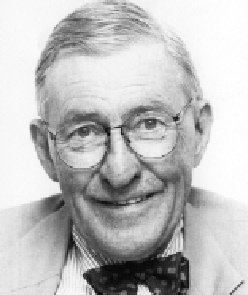Robert Craig - Mountaineer and founder of Keystone Center
Robert Craig, a scholar and mountaineer who founded the Keystone Center, died in Denver on January 16, 2015 at age 90.
Born in 1924 in California, Craig moved in the mid-1930s to Seattle, where the Cascades ignited his passion for mountaineering. In 1939, as a high-school sophomore, he read in the Saturday Evening Post that no one had successfully climbed K2 in the Himalayas and vowed that he would do it someday. Fourteen years later, having sharpened his skills as a guide on Mount Rainier, leading ascents of Kate’s Needle, Devil’s Thumb, and Mount McKinley in Alaska, and completing climbs in the Rockies, Craig fulfilled the promise. In 1953, he joined seven other Americans to form the Third American Karakoram Expedition for the first American attempt to summit K2, an effort that left four climbers injured and one dead. Craig and teammate Charlie Houston detailed the climb in their 1954 book, K2: The Savage Mountain.
Craig’s second book, Storm and Sorrow in the High Pamirs, recounts a second tragic expedition to the Soviet Pamirs in 1974 in which weather and avalanches led to the death of 14 climbers. Craig was buried twice in avalanches but was recovered by teammates. In 1983, he agreed to lead a final international climb: the American-Tibetan Everest West Ridge Expedition. He made it to 24,000 feet elevation and fellow team members to 28,000 feet, without oxygen. He was 59.
During World War II, he served as a Naval officer in the western Pacific and was on the first Naval ship to arrive in Nagasaki after the atomic bomb was dropped. After the war, he earned a bachelor’s degree in philosophy and a B.S. in biology at the University of Washington, followed by a master’s and doctorate in philosophy at Columbia University. During the Korean War, Craig accepted a civilian position in Colorado training troops at the Army’s Mountain and Cold Weather Training Command at Camp Carson and moved to Aspen, where he met Aspen Institute founder Walter Paepcke. In 1953, Paepcke appointed Craig as the first executive director of the Aspen Institute.
After a decade, Craig left the Institute and became a principal in two planning and industrial design consulting firms. During this period he and his first wife, Carol Galun, also owned and operated a family ranch outside Aspen. There they raised their three children, Kathleen, Jennifer, and Michael until their divorce in the late 1960s.
In 1975, Craig relocated to Keystone at the behest of then-president Bob Maynard, who encouraged Craig to consider another Aspen Institute-like enterprise that would set Keystone apart as a center for intellectual pursuits. That same year, he founded The Keystone Center, a collaborative problem-solving organization that initially focused on environmental regulatory issues. The Center, which Craig led as president and CEO until 1996, remains headquartered in Keystone and has expanded its work to address other critical state and national policy issues. It was in Keystone that he met his wife and partner of more than 30 years, Terry McGrath.
A past president of the American Alpine Club, Craig was inducted into the American Mountaineering Museum’s Hall of Mountaineering Excellence in 2010. He skied until he was 88. He is survived by his wife, Terry, of Keystone, Colorado and his children: Kathleen and Jim Jacobs of Great Barrington, Massachusetts, Jennifer Craig of Aspen, Colorado, and Michael Craig of Carbondale, Colorado. (Source: Keystone Policy Center, www.keystone.org)
